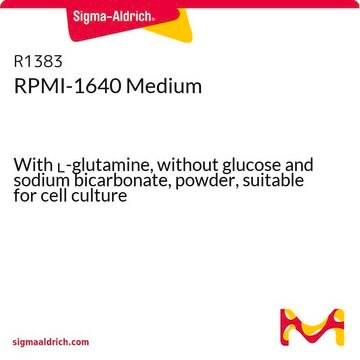R7755
RPMI-1640 Medium
AutoMod™, without L-glutamine and sodium bicarbonate, powder, suitable for cell culture
Produkcja farmaceutyczna
Synonim(y):
Roswell Park Memorial Institute 1640 medium
About This Item
Polecane produkty
Poziom jakości
Postać
powder
metody
cell culture | mammalian: suitable
komponenty
sodium pyruvate: no
HEPES: no
NaHCO3: no
L-glutamine: no
phenol red: yes
Warunki transportu
ambient
temp. przechowywania
2-8°C
Szukasz podobnych produktów? Odwiedź Przewodnik dotyczący porównywania produktów
Opis ogólny
Inne uwagi
Without L-glutamine and sodium bicarbonate.
Ilość
Rekonstytucja
Informacje prawne
najczęściej kupowane z tym produktem
suplement
Kod klasy składowania
11 - Combustible Solids
Klasa zagrożenia wodnego (WGK)
WGK 2
Temperatura zapłonu (°F)
Not applicable
Temperatura zapłonu (°C)
Not applicable
Certyfikaty analizy (CoA)
Poszukaj Certyfikaty analizy (CoA), wpisując numer partii/serii produktów. Numery serii i partii można znaleźć na etykiecie produktu po słowach „seria” lub „partia”.
Masz już ten produkt?
Dokumenty związane z niedawno zakupionymi produktami zostały zamieszczone w Bibliotece dokumentów.
Klienci oglądali również te produkty
Nasz zespół naukowców ma doświadczenie we wszystkich obszarach badań, w tym w naukach przyrodniczych, materiałoznawstwie, syntezie chemicznej, chromatografii, analityce i wielu innych dziedzinach.
Skontaktuj się z zespołem ds. pomocy technicznej



